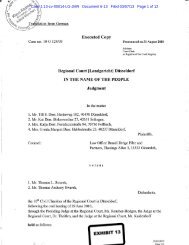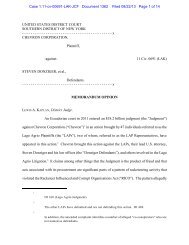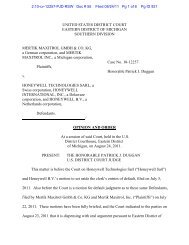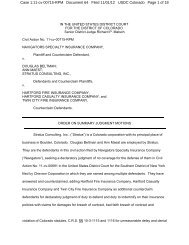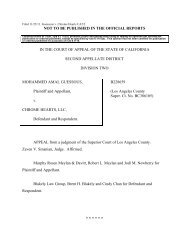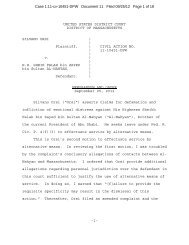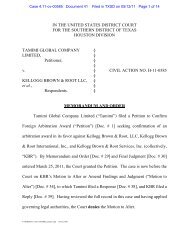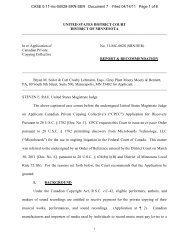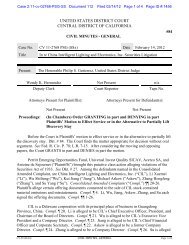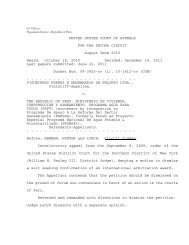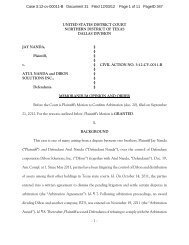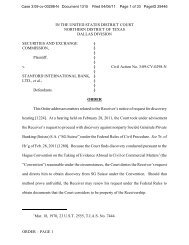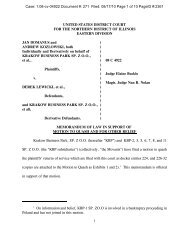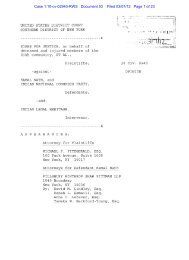overruled Taskin's objections and adopted the ... - Letters Blogatory
overruled Taskin's objections and adopted the ... - Letters Blogatory
overruled Taskin's objections and adopted the ... - Letters Blogatory
Create successful ePaper yourself
Turn your PDF publications into a flip-book with our unique Google optimized e-Paper software.
Case 0:08-cv-60623-WPD Document 443 Entered on FLSD Docket 11/16/2011 Page 1 of 6<br />
BANK OF MONGOLIA,<br />
v.<br />
Plaintiff,<br />
UNITED STATES DISTRICT COURT<br />
SOUTHERN DISTRICT OF FLORIDA<br />
CASE NO.: 08-60623-DIMITROULEAS/SNOW<br />
M&P GLOBAL FINANCIAL SERVICES et al.,<br />
Defendants.<br />
_______________________________________/<br />
ORDER DENYING DEFENDANT TASKIN’S<br />
MOTION FOR RELIEF FROM FINAL DEFAULT JUDGMENT<br />
THIS CAUSE is before <strong>the</strong> Court upon Defendant Senol Taskin’s Motion for Relief from<br />
Final Default Judgment [DE 432] <strong>and</strong> Magistrate Judge Lurana S. Snow’s Report <strong>and</strong><br />
Recommendation [DE 439] on that Motion. The Court has carefully considered <strong>the</strong> Motion, <strong>the</strong><br />
Report <strong>and</strong> Recommendation, <strong>and</strong> Defendant Taskin’s Objections [DE 442], <strong>and</strong> is o<strong>the</strong>rwise<br />
fully advised in <strong>the</strong> premises. This Court has also conducted a de novo review of <strong>the</strong> record <strong>and</strong><br />
<strong>the</strong> arguments made by <strong>the</strong> parties. Based on this review, <strong>the</strong> Court finds that Defendant Taskin’s<br />
Motion must be DENIED.<br />
A brief review of <strong>the</strong> lengthy docket in this case is necessary. Plaintiff filed an Amended<br />
Complaint including a federal RICO claim against Taskin on December 11, 2009. [DE 140].<br />
Taskin was served in Canada on January 7, 2010, by registered mail. [DE 162]. The Clerk<br />
entered a Clerk’s Default against Taskin on February 23, 2010. [DE 164]. Plaintiff <strong>the</strong>n filed a<br />
motion for default judgment against Taskin on March 19, 2010. [DE 186]. This Court issued an<br />
Order to Show Cause to Taskin requiring a response to <strong>the</strong> motion for default judgment by April<br />
16, 2010. [DE 217].
Case 0:08-cv-60623-WPD Document 443 Entered on FLSD Docket 11/16/2011 Page 2 of 6<br />
Because Taskin failed to respond, <strong>the</strong> Court entered Final Judgment against him on April<br />
19, 2010. [DE 236]. The Court referred <strong>the</strong> matter to Magistrate Judge Snow for an evidentiary<br />
hearing on <strong>the</strong> amount of damages, id., which she found to be $67,639,921.62, [DE 364]. Taskin<br />
did not object to that amount <strong>and</strong> this Court <strong>adopted</strong> Judge Snow’s Report <strong>and</strong> Recommendation<br />
on November 1, 2010. [DE 370].<br />
On November 9, 2010, Taskin filed a “Declaration” [DE 371], which this Court<br />
construed as a Motion to Alter/Amend a Judgment or for Relief from a Judgment under Federal<br />
Rules of Civil Procedure 59 <strong>and</strong> 60. [DE 381]. The Court denied that relief both on <strong>the</strong> merits<br />
<strong>and</strong> on <strong>the</strong> basis of timeliness. Id. Taskin did not move for reconsideration of that denial nor<br />
sought an appeal.<br />
Taskin <strong>the</strong>n filed <strong>the</strong> instant Motion for Relief from Final Default Judgment [DE 432]<br />
under Federal Rule of Civil Procedure 60(b)(4) on September 2, 2011. Rule 60(b)(4) allows a<br />
party to challenge a judgment on <strong>the</strong> grounds that <strong>the</strong> judgment was “void.” Taskin argues that<br />
<strong>the</strong> judgment was void for lack of personal jurisdiction <strong>and</strong> for insufficient service of process.<br />
Regarding personal jurisdiction, he alleges that his Declaration created issues requiring an<br />
evidentiary hearing on personal jurisdiction <strong>and</strong> that at that hearing Defendant Taskin would<br />
have established that Plaintiff failed to satisfy Florida’ long-arm statute, that Taskin lacks<br />
sufficient minimum contacts in order to justify personal jurisdiction, <strong>and</strong> that exercising personal<br />
jurisdiction would offend traditional notions of fair play <strong>and</strong> substantial justice. These faults, he<br />
argues, violate his due process rights. As to service of process, Defendant Taskin argues that<br />
service of process by registered mail violated Article 10(a) of <strong>the</strong> Hague Convention.<br />
As Judge Snow’s Report <strong>and</strong> Recommendation indicates, this Court has already<br />
considered <strong>the</strong>se arguments <strong>and</strong> rejected <strong>the</strong>m on <strong>the</strong>ir merits when <strong>the</strong>y were raised through <strong>the</strong><br />
-2-
Case 0:08-cv-60623-WPD Document 443 Entered on FLSD Docket 11/16/2011 Page 3 of 6<br />
Declaration. See [DE 381]. The Court will briefly address new arguments Taskin raises<br />
regarding <strong>the</strong> propriety of that Order before it adopts <strong>and</strong> approves this portion of <strong>the</strong> Report <strong>and</strong><br />
Recommendation.<br />
Judge Snow’s Report <strong>and</strong> Recommendation also rejected Taskin’s Motion on <strong>the</strong> ground<br />
that it was untimely. Taskin objected that a motion for relief from a judgment under Federal<br />
Rule of Civil Procedure 60(b)(4) is not required to be made within a “reasonable time.” The<br />
Eleventh Circuit has said that because a motion under Rule 60(b)(4) is a jurisdictional challenge,<br />
<strong>the</strong> reasonable time requirement set forth in Rule 60(c) does not apply. Hertz Corp. v. Alamo<br />
Rent-a-Car, Inc., 16 F.3d 1126, 1130 (11th Cir. 1994). As a result, this objection is sustained <strong>and</strong><br />
<strong>the</strong> Court does not adopt that portion of <strong>the</strong> Report <strong>and</strong> Recommendation based on timeliness.<br />
DISCUSSION<br />
Taskin argues that <strong>the</strong> judgment against him is void <strong>and</strong> may be challenged under Federal<br />
Rule of Civil Procedure 60(b)(4). Federal courts generally grant relief under Rule 60(b)(4) only<br />
in <strong>the</strong> “exceptional case in which <strong>the</strong> court that rendered judgment lacked even an ‘arguable<br />
basis’ for jurisdiction.” United States Aid Funds, Inc. v. Espinosa, 130 S. Ct. 1367, 1377 (2010).<br />
The burden of proof rests on <strong>the</strong> defendant to show lack of jurisdiction. In re Worldwide Web<br />
Systems, Inc., 328 F.3d 1291, 1298-99 (11th Cir. 2003). This Court has already found that <strong>the</strong><br />
substance of Taskin’s arguments lack merit. [DE 381]. Taskin is bound by <strong>the</strong> law of <strong>the</strong> case on<br />
<strong>the</strong>se issues. Christianson v. Colt Indus. Operating Corp., 486 U.S. 800, 816-17 (1988).<br />
Never<strong>the</strong>less, <strong>the</strong> Court will address Taskin’s procedural arguments.<br />
A. Necessity of an Evidentiary Hearing<br />
Taskin argues that <strong>the</strong> Court should have held an evidentiary hearing to determine<br />
whe<strong>the</strong>r it could exercise personal jurisdiction over Taskin. He cites Laux v. Carnival Corp., 470<br />
-3-
Case 0:08-cv-60623-WPD Document 443 Entered on FLSD Docket 11/16/2011 Page 4 of 6<br />
F. Supp. 2d 1379, 1381 (S.D. Fla. 2007), which held that in order to assert personal jurisdiction<br />
over a defendant, <strong>the</strong> court must first consider whe<strong>the</strong>r <strong>the</strong>re is jurisdiction under <strong>the</strong> state’s long-<br />
arm statute <strong>and</strong> <strong>the</strong>n must consider whe<strong>the</strong>r <strong>the</strong>re are sufficient minimum contacts to satisfy <strong>the</strong><br />
Constitution. Id. (citing Sculptchair, Inc. v. Century Arts, Ltd., 94 F.3d 623, 626 (11th Cir.<br />
1996)). The court <strong>the</strong>n cited <strong>the</strong> Florida Supreme Court for <strong>the</strong> proposition that when opposing<br />
affidavits disputing personal jurisdiction cannot be reconciled, “<strong>the</strong> trial court will have to hold a<br />
limited evidentiary hearing in order to determine <strong>the</strong> jurisdiction issue.” Id. (quoting Venetian<br />
Salami v. J.S. Par<strong>the</strong>nais, 554 So. 2d 499, 503 (Fla. 1989)).<br />
This Court finds that Taskin’s reliance on Laux, <strong>the</strong> Florida long-arm statute, <strong>and</strong><br />
Florida’s rules on evidentiary hearings is misplaced. A court need only consider a state’s long-<br />
arm statute if <strong>the</strong> federal statute creating a cause of action lacks a provision regarding service of<br />
process. See United States v. SEC, 115 F.3d 1540, 1543-44 (11th Cir. 1997). The RICO Act<br />
contains a provision that allows for nationwide service of process. 18 U.S.C. § 1965(b).<br />
Therefore, <strong>the</strong> relevant inquiry is whe<strong>the</strong>r <strong>the</strong> party had sufficient minimum contacts with <strong>the</strong><br />
United States. United States v. SEC, 115 F.3d at 1543-44. Compliance with Florida’s long-arm<br />
statute is not required to give this Court personal jurisdiction over Taskin. Consequently, <strong>the</strong><br />
Florida Supreme Court’s interpretation of proper evidentiary hearings on Florida’s long-arm<br />
statute is also irrelevant.<br />
The Eleventh Circuit has held that an evidentiary hearing on personal jurisdiction is<br />
discretionary. E.g. United States v. SEC, 115 F.3d at 1542. If <strong>the</strong> Court chooses not to hold <strong>the</strong><br />
hearing, <strong>the</strong>n <strong>the</strong> plaintiff must establish a prima facie case for jurisdiction, which <strong>the</strong> defendant<br />
may dispute through affidavits. Id. (citations omitted). A prima facie case exists if <strong>the</strong> plaintiff<br />
presents enough evidence to withst<strong>and</strong> a motion for a directed verdict. Id. When <strong>the</strong>re is a<br />
-4-
Case 0:08-cv-60623-WPD Document 443 Entered on FLSD Docket 11/16/2011 Page 5 of 6<br />
conflict, all reasonable inferences must be made in favor of <strong>the</strong> plaintiff. Id. Plaintiff provided<br />
sufficient evidence to withst<strong>and</strong> a motion for directed verdict. See [DE 381 (finding sufficient<br />
contacts for personal jurisdiction <strong>and</strong> citing evidence)]. Any conflicts arising from Taskin’s<br />
conclusory, unsupported affidavit are overcome by <strong>the</strong> reasonable inferences from Plaintiff’s<br />
evidence. The Court finds that an evidentiary hearing was not required.<br />
B. Ability to Respond to Plaintiff’s Response to <strong>the</strong> Declaration<br />
Taskin also objected that he was not given an opportunity to Reply to Plaintiff’s<br />
Response to his Declaration; however, this objection is meritless <strong>and</strong> is <strong>overruled</strong>. The Court<br />
ordered a response to <strong>the</strong> Declaration because <strong>the</strong> Court construed <strong>the</strong> Declaration as a Motion to<br />
Alter/Amend a Judgment or for Relief from a Judgment. [DE 372]. Plaintiff filed a Response in<br />
Opposition, [DE 380], but Defendant never filed a Reply. Sou<strong>the</strong>rn District of Florida Local Rule<br />
7.1(c) permits a party to serve a reply to a response within seven (7) days after receiving <strong>the</strong><br />
response. Pro se litigants are required to follow <strong>the</strong> rules of <strong>the</strong> Court. E.g. Albra v. Advan, Inc.,<br />
490 F.3d 826, 829 (11th Cir. 2007). Taskin’s failure to take advantage of <strong>the</strong> opportunity to<br />
Reply does not void <strong>the</strong> Court’s Order rejecting his Declaration.<br />
C. Minimum Contacts, Fair Play <strong>and</strong> Substantial Justice, Sufficiency of Service, <strong>and</strong> Due<br />
Process<br />
The Court must reject Taskin’s remaining arguments that minimum contacts were<br />
lacking, that personal jurisdiction does not satisfy fair play <strong>and</strong> substantial justice, that service of<br />
process was deficient, <strong>and</strong> that due process was not met. The Court’s prior order on Taskin’s<br />
Declaration, construed as a motion for relief from judgment under Federal Rule of Civil<br />
Procedure 60(b), disposed of all of <strong>the</strong>se issues on <strong>the</strong>ir merits. See [DE 381]. The law of <strong>the</strong><br />
case doctrine provides that “when a court decides upon a rule of law, that decision should<br />
continue to govern <strong>the</strong> same issues in subsequent stages in <strong>the</strong> same case” unless <strong>the</strong> original<br />
-5
Case 0:08-cv-60623-WPD Document 443 Entered on FLSD Docket 11/16/2011 Page 6 of 6<br />
decision was “clearly erroneous <strong>and</strong> would work a manifest injustice.” Christianson v. Colt<br />
Indus. Operating Corp., 486 U.S. 800, 816-17 (1988). The Court does not find its earlier Order<br />
clearly erroneous <strong>and</strong> does not find that <strong>the</strong> Order works manifest injustice, so <strong>the</strong> Court’s<br />
decision on <strong>the</strong>se issues must st<strong>and</strong>.<br />
Accordingly, it is ORDERED AND ADJUDGED as follows:<br />
1. Magistrate Judge Lurana S. Snow’s Report <strong>and</strong> Recommendation [DE 439] is<br />
ADOPTED AND APPROVED IN PART;<br />
2. Defendant Senol Taskin’s Motion for Relief from Final Default Judgment [DE<br />
432] is DENIED.<br />
DONE AND ORDERED in Chambers at Fort Lauderdale, Broward County, Florida, this<br />
16th day of November, 2011.<br />
Copies furnished to:<br />
Counsel of Record<br />
-6



